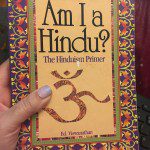The well respected Himalayan Academy and their guru Subramuniyaswami put out a book several years ago called How To Become a Hindu. Over the next few weeks I’ll be reading the chapters and discussing each one individually. Today we’re looking at the fifth chapter: Gurudeva Speaks on Ethical Conversion.
This week’s chapter is called Does Hinduism Accept Newcomers?
It has some very interesting categories and quotes from several respected sources. The first part of the chapter gives a number of definitions of what makes someone a Hindu.
Definitely an important question to clarify before moving on to Does Hinduism Accept Newcomers!
First of all, he distinguishes Hinduism from some of its “cousins”, like Jainism, Buddhism, and Sikhism, in the acceptance of the Vedas as scriptural authority. Hindus believe in the Vedas, he explains, while what makes these off-shoots their own religions is that they do not.
“Those who follow the Hindu way of life are Hindus.”
Subramuniyaswami supports this with a quote from The Mahabharata in which Yudhishthira said that what makes someone a brahmin is conduct, rather than learning or birth.
Sri K. Navaratnam apparently gave these 11 beliefs as the fundamental basis of what makes someone Hindu…
1) A belief in the existence of God
2) A belief in the existence of a soul separate from the body
3) A belief int he existence of the finitizing principle known as avidya or maya
4) A belief int he principle of matter (prakriti or maya)
5) A belief in the theory of karma and reincarnation
6) A belief int he indispensable guidance of a guru to guide the spiritual aspirant towards God Realization.
7) A belief in moksha, liberation, as the goal of human existence
8) A belief in the indispensable necessity of temple worship in religious life
9) A belief in graded forms of religious practices, both internal and external, until one realizes God.
10) A belief in ahimsa as the greatest dharma or virtue
11) A belif in mental and physical purity as indispensable factors for spiritual progress
Sri Sri Sri Jayendra Saraswati (a Shankaracharya) is quoted as defining Hinduism with these four beliefs…
1) The concept of idol worship and the worship of God in his Nirguna as well as Saguna form (The Absolute without form or qualities v.s. the Absolute with form and qualities)
2) The wearing of sacred marks on the forehead
3) Belief in the theory of past and future births in accordance with the theory of karma
4) Cremation of ordinary men and burial of great men
Hindu Vishva gives this definition…
“He who has perfect faith in the law of karma, the law of reincarnation, avatara, ancestor worship, varnashrama dharma (social duty), Vedas and existence of God; he who practices the instructions given int he Vedas with faith and earnestness; he who does ritual bathing, death memorial, offerings to ancestors, and the five great sacrifices (to rishis, ancestors, Gods, creatures, and men), he who follows the dharmas, he who worships the avatars and studies the Vedas is a Hindu.”
The Indian Supreme Court codified this definition…
Acceptance of the Vedas with reverence as the highest authority in religious and philosophic matters and acceptance with reverence of Vedas by Hindu thinkers and philosophers as the sole foundation of Hindu philosophy.
2) Spirit of tolerance and willingness to understand and appreciate the opponent’s point of view based on the realization that truth is many sided.
3) Acceptance of great world rhythm by all six systems of Hindu philosophy vast periods of creation, maintenance and dissolution follow each other in endless succession;
4) Acceptance by all systems of Hindu philosophy of the belief in rebirth and pre-existence.
5) Recognition of the fact that the means or ways to salvation are many
6) Realization of the truth that numbers of Gods to be worshiped may be large, yet there being Hindus who do not believe in the worshiping of idols.
7) Unlike other religions, or religious creeds, Hindu religion’s not being tied down to any definite set of philosophic concepts, as such.
And the Himalayan Academy themselves have put together a summary of the Nine Beliefs of Hinduism…
1) Hindus believe in the divinity of the Vedas
2) Hindus believe in a one, all-pervasive Supreme Being who is both immanent and transcendent, both Creator and Unmanifest Reality
3. Hindus believe that the universe undergoes endless cycles of creation, preservation, and dissolution
4. Hindus believe in karma…by which each individual creates his own destiny by his thoughts, words and deeds.
56. Hindus believe that the soul reincarnates, evolving through many births until all karmas have been resolved, and moksha is attained. Not a single soul will be eternally deprived of this destiny.
6. Hindus believe that divine beings exist in unseen worlds and that temple worship, rituals and sacraments as well as personal devotionals create a communion with these devas and Gods.
7. Hindus believe that a spiritually awakened master is essential to know the Transcendent Absolute, as are personal discipline, good conduct, purification, pilgrimage, self-inquiry and meditation.
8. Hindus believe that all life is sacred…and therefore practice ahimsa
9. Hindus believe that no particular religion teaches the only way to salvation above all others, but that all genuine religious paths are facets of God’s Pure Love
***
So, clearly it is difficult to come to an agreement on a definition of Hinduism! Even here, while there are many similar concepts, there are some noticeable differences too.
By most of these definitions I’m a Hindu, so that’s a relief. The cremation of regular men and burial of “special” men is a new one to me. I haven’t heard that before.
The ones about the gurus still stick for me. While I think spiritual guides and Realized teachers are a wonderful thing and an important step for most people, I still don’t think it is strictly necessary. The reason being that I’ve been told many stories of people who became Enlightened through great service or self-sacrifice, without ever being taught explicitly to do it. I assume that their past study in previous lives led them to an innate understanding of how to find their way out of the sticky web of life.
Temple worship is the same thing. If you meet God daily in your life tasks, you don’t have to go to a temple to see Him.
Which is to say that some people are progressed in their journey to those points and I am not! The energies of the temple are important for my worship and the guidance of gurus I trust is very valuable to me.
The chapter goes on to explain that Hinduism has always accepted converts and “adoptives” and points out that areas around India now have large Hindu populations that had to have started somewhere.
There are quotes from Swami Vivekananda about welcoming newcomers into the fold and a very moving quote from a Sri Ram Swarup about the “power” of those who have come to the Hindu faith, explaining that there is a new third category of Hindus that includes the people joining it from the west.
The chapter ends with an explanation of a ceremony of welcoming back, meant for people whose ancestors had been forcibly converted away from Hinduism long ago.
It seems that there are actually several ways that someone could end up being a Hindu. It is certainly not as cut and dry as many think.













